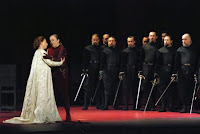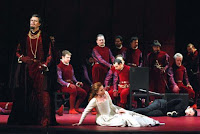I started this entry on October 10th and am finally getting around to finishing it - family, Thanksgiving and life got in the way. The dates are all wrong of course but .....
 |
Paris 1894: Verdi rehearsing Falstaff as
captured by Maurice Feuillet. |
|
It seems only appropriate that on the 101st anniversary (October 10, 1813) of Guiseppe Verdi's birth and after several postings about the opera itself that I finally get around to writing something about last Friday (October 3rd) evening's performance of
Falstaff by the Canadian Opera Company. Last presented in 2004 at the Hummingbird (O'Keefe, Sony, whatever) Centre in the elegant but very traditional Jean-Pierre Ponnelle production this new production was in the purpose built
Four Seasons Centre for the Performing Arts in a new production by Robert Carsen. The production is a joint undertaking that has already been seen at La Scala, Covent Garden and the MET with further performances to come at the Dutch National Opera. It also marked the greatly anticipated return of Gerald Finley to the COC after an absence of 20 years and his debut in the title role.
This was my first visit to the "new" opera house since it opened in September 2006 with the first Canadian performance of the complete Ring Cycle. When it opened the Centre, with its five-tiered, horseshoe-shaped auditorium, was praised for its superior sight lines and acoustics and on first viewing I can only second that praise. From my seat at centre in Ring 3 I had an uninterrupted view of the stage. The sound was warm and immediate and there was never a problem of balance between the pit and the stage.

My only caveat has to do with a personal preference: I despise surtitles! Yes I know they are a Canadian invention - yeh Canada! - but I find them distracting and from my seat (for the entire season I might add) I am at direct eye level with the proscenium surtitle panel. However that is my only gripe with the facility - the buffet does an excellent chocuterie plate, prices are reasonable for a glass of bubbly, the public areas spacious and the washrooms plentiful. Now on to the performance itself.

Several of my opera
mad loving friends have expressed puzzlement at my love for
Falstaff - one friend went as far as to say that neither Verdi nor Wagner should have been allowed (gasp!) to write comedies. And I can understand their feelings - it's not an easy work and I grappled with it for a long time. However I think I've made it fairly obvious that this is a piece I love and this performance only made me aware of how much joy and laughter there is in it.
 |
| The Ford's kitchen updated to Windsor 1950s by designer Paul Steinberg: Mistress Ford had all the mod-cons but still did her laundry by the Thames! |
Much has made of director Robert Carsen's decision to update the action to the reign of Queen Elizabeth, the second of that name. After the Second World War many of the British nobility (Sir John Falstaff) were impoverished and the affluent middle-class (the Fords) were on the rise. It is not a new idea - Graham Vick's staging at Glyndebourne in 2009 was set in almost the same time period - and in many ways it made sense and much of it worked.
 |
Blinded by bling Falstaff (Gerald Finley) is easily
duped by Signor Fontana (Russell Braun). Two great
Canadian baritones match wits and voices!
Photo: Michael Cooper
|
Very little of the comedy was the traditional operatic schtick - I still don't understand why opera audiences find a baritone imitating a female voice in falsetto hysterically funny? - and being Carsen all of it sprang from the music. To my mind where he misjudged was setting the second scene of Act One in the posh restaurant of the Windsor Arms and in having that wonderful meeting of Mistress Quickly (Marie-Nicole Lemieux) and Falstaff (Gerald Finley) take place in the men's smoking room of the hotel.
And unfortunately Russel Braun was given some ridiculously over the top business leading up to, and during, Ford's great jealousy monologue. Surely this is not a time for comedy? The man is almost insane with jealousy and there is nothing to suggest that either Verdi or Boito intended this as satire or a source of amusement. Braun overcame the staging to deliver a gripping, almost frightening, portrayal of a man giving voice to the overwhelming, though unreasonable, emotion of betrayal.
 |
Mistress Quickly (Marie-Nicole Lemieux) tempts Sir
John with the promise of an assignation with Mistress
Ford "dalle due alle tre". Photo: Veronika Roux-Vlachova
|
Lemieux has appeared in this production previously at the Met and La Scala and has honed her Quickly dramatically and vocally. She has the deep rich tones and just the right timing to make the mere word "Reverenza" hysterically funny. And she gave the proper chill to the beginning of the
nero Cacciator narrative - it's unfortunate that business with grooms sweeping up the hay left by the horse (?) Falstaff had shared his musing on an unjust world with undermined what can be an atmospheric introduction to the scene that follows. The balance of the women were fine without delivering a great deal of individuality. If Simone Osborne's Nanetta sounded a trifle unsteady during her Act 3 aria it was understandable given that she was being trundled around on a wheeled table.
Again the supporting men did not seem to have a great deal of individuality - perhaps the fault is Verdi's? I was hard pressed to distinguish Bardolpho (Colin Ainsworth) from Pistola (Robert Glaedow) though Michael Colvin's Dr. Caius was a finely drawn comic creation. Frédéric Antoun was a lyrical Fenton if again not quite hitting the mark in his lovely aria in the final scene.
The COC chorus destroyed the Ford kitchen and tormented Falstaff in fine fashion. The orchestra responded to Johannes Debus youthful approach with brio. This was his first go at a very complex work and he caught the brio and sparkle if not any of the autumnal overtones. Only once - and briefly - in those tricky ensembles in the second scene did he seem to lose control of his forces.
 |
It takes Gerald Finley over two hours get into the various prosthesis that turn him into
Verdi's Fat Knight. The process was captured in video and photos by the Toronto Star.
Anne-Marie Jackson / Toronto Star
|
And Gerald Finley? "What of him?", you ask. After all the opera is called Falstaff and it was his role debut. I willingly join the choruses of praise that are being sung in reviews in the media and in blogdom. Often the role is seen as an opportunity for an aging baritone/bass to bark his way through it in buffo style, which betrays everything that Verdi put into it. That Finley would be able to actually sing the part was never in question. And sing it he did - richly and gloriously. That glorious singing was matched by a comic timing that was perfect. And much of the comic delight was in the small details - as an example, the slightly hurt look he gave Mistress Ford before launching into
Quand'ero paggio.
It was possible to believe that this Falstaff had been quite the gallant before gluttony and a fondness for the bottle took over. And this was a Falstaff who could say with total conviction:
You laugh at me, but it is I who makes you clever. My wit creates the wit of others. It's a portrayal which, given Finley's vocal and dramatic abilities, will grow richer over time. I am more than happy to be able to say: I was there when ......
 |
| Falstaff (Gerald Finley) and friends raise their glasses and assure us that "he who laughs last, laughs best!" |
There was a light drizzle/mist as I walked out onto University Ave after having been reassured that "All the World is a joke and all men (including me I can assure you) are clowns." On the brief trot up to the hotel I felt, as I have done after every performance I've ever seen of Falstaff, that there was much that was right with the world.
The following is the promotional video from the COC website for the production. I was more than pleased, as I'm sure they are, to see that all seven performances were sold out.
October 23 - 1867: 72 Senators are summoned by Royal Proclamation to serve as the first members of the Canadian Senate.













